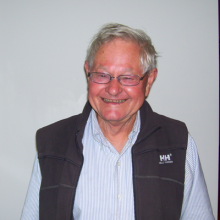Dr. William (“Bill”) Beyers has the unusual privilege and distinction of serving his entire academic career at a single institution. In 1958 he finished his undergraduate work at University of Washington, and his mentor Morgan Thomas, encouraged Bill to continue with graduate work (“demanded it”, as Bill recounted). Thomas was an economic geographer and former chair of the Geography department. When Bill received his PhD in 1967, the university was undergoing rapid expansion, and he suspects this contributed to his luck in getting a faculty position in the department. His research centers upon economic, regional, and urban geography. He employs “input-output models” and has focused upon the service sector of the economy in the American West, and economic downturns in the Puget Sound region.
Dr. Beyers has had an astonishing impact on the department and the Seattle region over the course of his career. His class on the geographies of the Pacific Northwest, which he initiated as a graduate student, has now reached its 50th year. As a graduate student he helped develop the Seattle area’s first “input-output model” – a statistical way of exploring the interdependency of different economic sectors in a region. The importance of that work is drawn in sharp relief when considering that Washington state now has eight different models, making it the richest source of survey data for economic analysis in the world. What’s more, his 1985 paper “Export Services in Post-industrial Society” has been one of the most highly cited papers in the field of regional science.
Over the course of his career, he’s seen the department evolve in many exciting ways yet retain core values he appreciates. Even though the department’s overall research foci have shifted from his core interests, what has remained constant has been the “face of the department.” The department has attracted consistently high-quality faculty and graduate students, and that has made our department competitive among geography programs worldwide and competitive with other departments on our own campus. Our scholarship is prestigious by any measure, including our publications, grants, and students, and this makes Dr. Beyers comfortable with the state of the department.
“Retirement” isn’t exactly what Dr. Beyers is moving into, as he continues to maintain an active research agenda, including consulting with Washington State’s input-output model managers, economic studies of the arts in the Puget Sound, and other consulting work for the city of Bellevue and the local festival Hempfest. However, he looks forward to sleeping in past his 8:30am teaching schedule and working in his garden. His longstanding interest in the arts will continue to influence his travel plans. His most recent trips included seeing Woody Allen’s production of Cinderella in Los Angeles and a Matisse exhibit at MoMA in New York.
